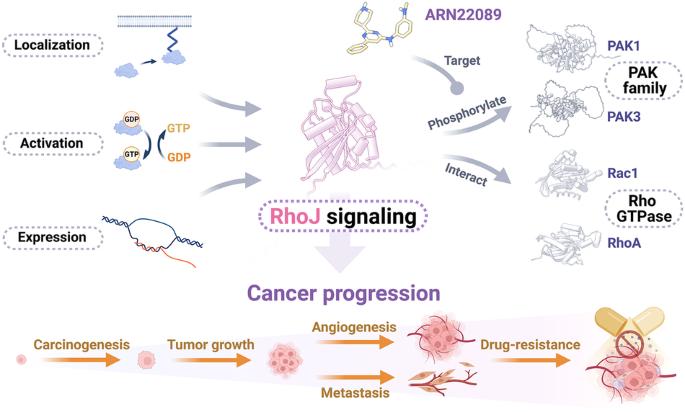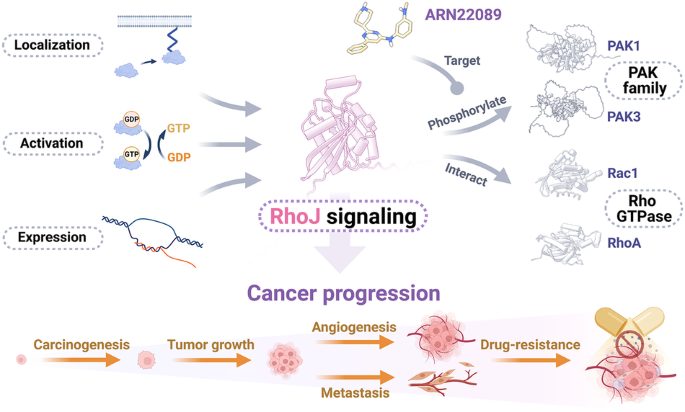RhoJ: an emerging biomarker and target in cancer research and treatment
IF 4.8
3区 医学
Q1 BIOTECHNOLOGY & APPLIED MICROBIOLOGY
引用次数: 0
Abstract
RhoJ is a Rho GTPase that belongs to the Cdc42 subfamily and has a molecular weight of approximately 21 kDa. It can activate the p21-activated kinase family either directly or indirectly, influencing the activity of various downstream effectors and playing a role in regulating the cytoskeleton, cell movement, and cell cycle. RhoJ’s expression and activity are controlled by multiple upstream factors at different levels, including expression, subcellular localization, and activation. High RhoJ expression is generally associated with a poor prognosis for cancer patients and is mainly due to an increased number of tumor blood vessels and abnormal expression in malignant cells. RhoJ promotes tumor progression through several pathways, particularly in tumor angiogenesis and drug resistance. Clinical data also indicates that high RhoJ expression is closely linked to the pathological features of tumor malignancy. There are various cancer treatment methods that target RhoJ signaling, such as direct binding to inhibit the RhoJ effector pocket, inhibiting RhoJ expression, blocking RhoJ upstream and downstream signals, and indirectly inhibiting RhoJ’s effect. RhoJ is an emerging cancer biomarker and a significant target for future cancer clinical research and drug development.


RhoJ:癌症研究和治疗中的新兴生物标志物和靶点。
RhoJ 是一种 Rho GTPase,属于 Cdc42 亚家族,分子量约为 21 kDa。它能直接或间接激活 p21 激活激酶家族,影响各种下游效应物的活性,并在调节细胞骨架、细胞运动和细胞周期方面发挥作用。RhoJ 的表达和活性受多种上游因素在不同水平上的控制,包括表达、亚细胞定位和活化。RhoJ 的高表达通常与癌症患者的不良预后有关,主要原因是肿瘤血管数量增加以及在恶性细胞中的异常表达。RhoJ 通过多种途径促进肿瘤进展,尤其是在肿瘤血管生成和耐药性方面。临床数据也表明,RhoJ 的高表达与肿瘤恶性的病理特征密切相关。针对 RhoJ 信号的肿瘤治疗方法有多种,如直接结合抑制 RhoJ 效应口袋、抑制 RhoJ 表达、阻断 RhoJ 上下游信号以及间接抑制 RhoJ 作用等。RhoJ 是一种新兴的癌症生物标志物,也是未来癌症临床研究和药物开发的重要目标。
本文章由计算机程序翻译,如有差异,请以英文原文为准。
求助全文
约1分钟内获得全文
求助全文
来源期刊

Cancer gene therapy
医学-生物工程与应用微生物
CiteScore
10.20
自引率
0.00%
发文量
150
审稿时长
4-8 weeks
期刊介绍:
Cancer Gene Therapy is the essential gene and cellular therapy resource for cancer researchers and clinicians, keeping readers up to date with the latest developments in gene and cellular therapies for cancer. The journal publishes original laboratory and clinical research papers, case reports and review articles. Publication topics include RNAi approaches, drug resistance, hematopoietic progenitor cell gene transfer, cancer stem cells, cellular therapies, homologous recombination, ribozyme technology, antisense technology, tumor immunotherapy and tumor suppressors, translational research, cancer therapy, gene delivery systems (viral and non-viral), anti-gene therapy (antisense, siRNA & ribozymes), apoptosis; mechanisms and therapies, vaccine development, immunology and immunotherapy, DNA synthesis and repair.
Cancer Gene Therapy publishes the results of laboratory investigations, preclinical studies, and clinical trials in the field of gene transfer/gene therapy and cellular therapies as applied to cancer research. Types of articles published include original research articles; case reports; brief communications; review articles in the main fields of drug resistance/sensitivity, gene therapy, cellular therapy, tumor suppressor and anti-oncogene therapy, cytokine/tumor immunotherapy, etc.; industry perspectives; and letters to the editor.
 求助内容:
求助内容: 应助结果提醒方式:
应助结果提醒方式:


